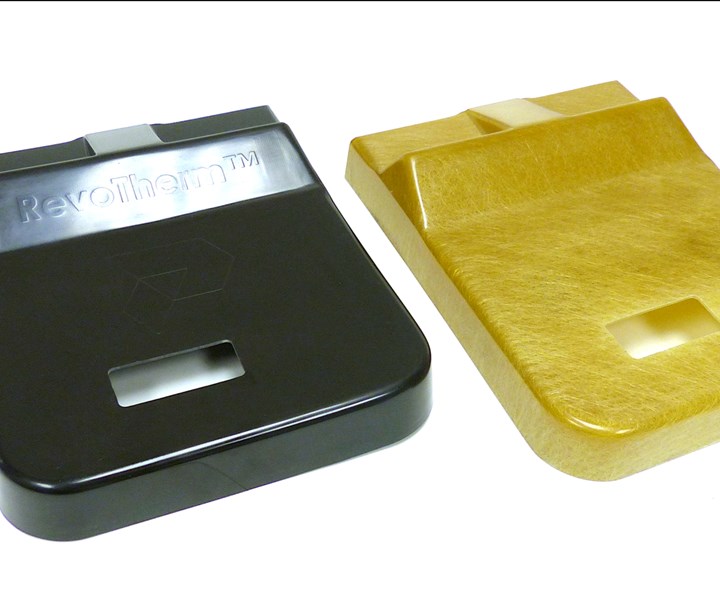Presidium launches fast-cure, high-strength resin system
Presidium USA is introducing to the composites manufacturing market the RevoTherm line of resin systems that offer low viscosity, fast cure and high strength in finished parts.

These two parts are molded with Presidium’s RevoTherm resin system. The part on the left is unreinforced; the part on the right has glass fiber reinforcement. Source | Presidium USA
Presidium USA (Dover, Del., U.S.) is introducing to the composites manufacturing market the RevoTherm line of resin systems that offer low viscosity, fast cure and high strength in finished parts. RevoTherm can be processed via closed molding systems (RTM-like or RIM-like) with or without fiber reinforcement; it also can be pultruded or foamed. RevoTherm is a urethane-based chemistry modified with a specialized polyol. It offers a modulus of 500,000-600,000 psi without fiber reinforcement. RevoTherm has a viscosity of 200-300 centipoise and cures as quickly as 1 minute or as long as 1 hour, depending on temperature and catalyst. RevoTherm RT-1000 is the unreinforced version; RevoTherm RT-2000 is the glass-reinforced version. According to the company, RT-2000 can be molded without vacuum pressure and offers properties comparable to or better than sheet molding compound (SMC), but with low-cost tooling.
Jeffery Ritz, CEO of Presidium USA, says RevoTherm is based on commercially available isocyantes (A), with the polyol supplied by Presidium. The resin, he says, is especially suited for the molding of medium to large parts in low and medium volumes where labor and tooling costs are key drivers. Initial end markets targeted include agriculture, heavy truck, marine, automotive aftermarket, and infrastructure. Contact Ritz directly for more information.
Related Content
-
IDI Composites opens new global headquarters, manufacturing and technology center
The Noblesville, Indiana, facility includes SMC and BMC manufacturing, an R&D center and the company’s corporate headquarters.
-
AOC introduces UV-Resistant Automotive System for SMC parts
AOC’s novel formulation, tested in the lab and in real-world environments, delivers a deep black, molded-in color that resists fading and offers high scratch resistance.
-
Dieffenbacher acquires Schmidt & Heinzmann composites business
The acquisition, which includes all intangible assets of the business unit, will expand Dieffenbacher’s SMC delivery spectrum, enable potential for portfolio growth and synergies.












.jpg;maxWidth=300;quality=90)


